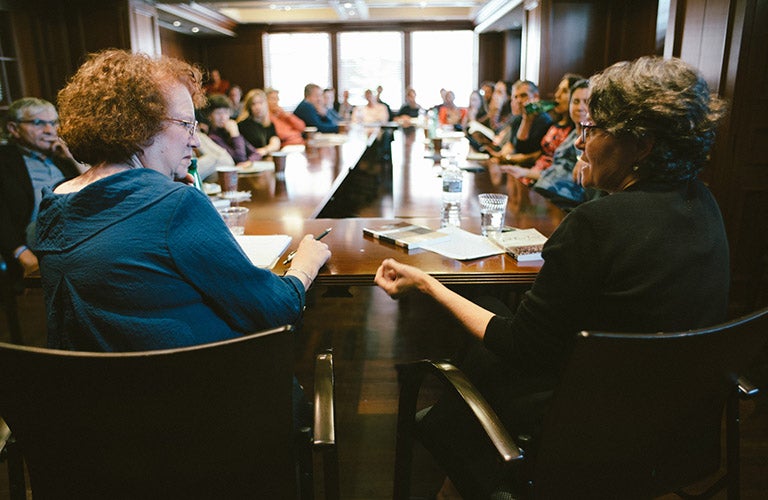Linkon Publishes Book on Deindustrialized Communities' Literature
May 8, 2018 — Professor Sherry Linkon of the Department of English at Georgetown College has published a new book on contemporary working-class literature, which she presented at a reading and interview at the Mortara Center last week.
The Half-Life of Deindustrialization is a collection of modern poetry, essays, short stories, art, and film — all by creators from communities affected by deindustrialization — alongside commentary and analysis from Linkon.
NEW WORKING CLASS LIT
Linkon developed the idea for the book after conducting a study on the social costs of deindustrialization. As an English professor with a background in working-class literature, she began investigating modern literature on the subject.
“I began to feel like there had to be a whole collection of these stories,” Linkon said. “There’s a body of literature that’s emerged in the last 20 years that helps us see these places — to see how the economic changes that have been occurring since the 1970s and ’80s are still shaping people’s lives.”
The book focuses on the particular experience of towns and cities that had lost a significant number of industrial jobs during the second half of the 20th century. In her analysis, Linkon works from a blueprint established mostly by British social scientists who had studied deindustrialization in the United Kingdom.
“I used some of these ideas for framing, asking myself ‘What should I be looking for?’” Linkon said. “Changing ideas about what work means. Questions of identity, especially at the intersection of race and class. Ideas about place — there’s a whole genre of ‘ruin porn’ that glamorize and aestheticize things like abandoned factories.”
Linkon hopes the book will be useful for both social scientists and literature scholars.
“For the social scientists, I wanted to show that literature has something to add to this, too — and I’m happy to say that at least a few are beginning to assign this book,” she said. “For literary scholars, I wanted to show how we need to bring working-class literature up to date. There’s only one text in my book from before 2000 — there’s a whole new wave of literature out there.”
INVISIBLE COMMUNITIES
Linkon began compiling material for The Half-Life of Deindustrialization in 2011, but the political rise of President Donald J. Trump made her work and the communities she studied more politically salient.
“I actually completed the first draft the day that Trump won the Republican nomination, and a lot of the revisions were happening during the election cycle and the first year of his presidency,” Linkon said. “I spent a lot of time researching what we called ‘the politics of resentment,’ and a lot of time talking to reporters about it.”
In 2016, Linkon and her husband John Russo published a series of op-eds for Moyers & Company that sought to elevate the experiences and analyze the politics of the post-industrial working class.
In November 2016, Trump’s upset victory made the Americans left behind by deindustrialization — many of whom crossed party lines to vote for Trump in critical swing states — the new hottest subject among national reporters. Even as headlines from the formerly “invisible” communities Linkon studies become commonplace in the nation’s largest news outlets, she believes analyzing and amplifying the literary work created in these communities is an important facet of understanding them.
“I hope it points people toward literature that they don’t know is out there,” Linkon said. “It’s not a reporter or a scholar going into a community and asking who they can interview, it’s people trying to tell the stories of people like them and their families. You get a different perspective.”
PUBLIC DISCUSSION
To commemorate the release of The Half-Life of Deindustrialization, Linkon participated in a public discussion with the Washington Post’s Amy Goldstein, who has written extensively on health policy, labor policy, and deindustrialization.
Goldstein and Linkon met in 2014, when Goldstein was a visiting scholar at Georgetown’s Kalmanovitz Initiative for Labor and the Working Poor. They began to discuss their shared interest in deindustrialization, and when Goldstein published her own book, Janesville: An American Story in 2017, the two collaborated on a publicity event.
“I spent a lot of time with Amy while she was writing her book, and got to interview her when her book came out last year,” Linkon said. “Now we’re just changing roles!”
Held in the Mortara Center, the event featured an interview followed by a reading from some of the literature that Linkon analyzes in The Half-Life of Deindustrialization.
“Getting a chance to talk about this book with my colleagues and students was really powerful. People asked such great questions,” Linkon said.
Sherry Linkon’s The Half-Life of Deindustrialization is available now from the University of Michigan Press.
